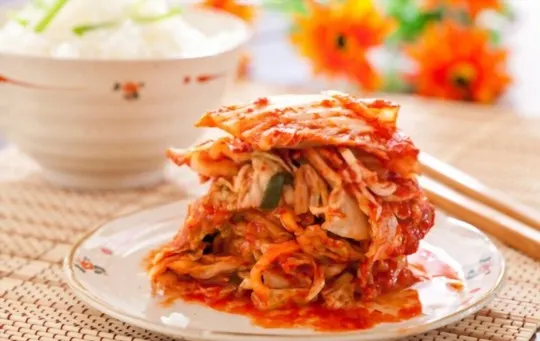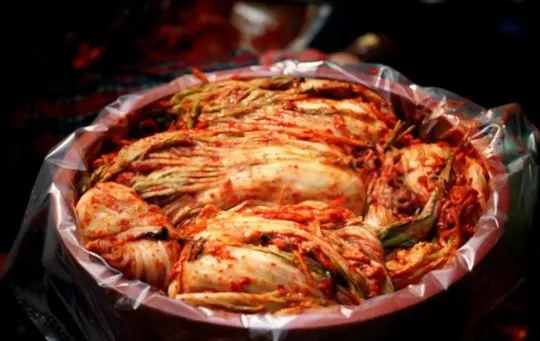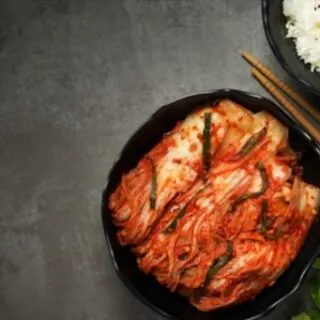If you are fan of likely kimchi, then you may have probably wondered whether it can go bad and how long does the beloved Korean condiment last?
Well, wonder no more.
In this blog post, we will discuss everything there is to know about storing and shelf-life of kimchi – from whether or not it’s okay to eat expired kimchi to figuring out if freezing is a must in order to extend its lifespan.
We’ll also talk about signs that reveal when your kimchi has gone bad so you can stay safe while still enjoying every bit of flavor!
So get ready for an insightful journey into the world of one amazing condiment – let’s learn all about the life cycle of Kimchi!
What’s Kimchi?

Kimchi is a traditional Korean dish made of fermented vegetables.
It is usually made with cabbage, radishes, and scallions, but other vegetables can be used as well.
Kimchi has a spicy, sour, and umami flavor and is often used as a side dish or condiment.
Fermented foods like kimchi are rich in probiotics, which are beneficial for gut health.
Kimchi is typically made by fermenting cabbage and other vegetables in a mixture of water, salt, and spices.
The fermentation process takes several weeks to complete.
Once the kimchi is ready, it can be stored in the fridge for several months.
If you’re looking to add more fermented foods to your diet, kimchi is a great place to start.
It’s easy to find in most grocery stores, and it’s relatively inexpensive. Plus, it’s delicious.
How to Store Kimchi?
If you’ve ever had kimchi, you know that it’s a delicious and unique fermented food.
Kimchi is made of cabbage and other vegetables that are fermented in a spicy sauce.
It’s a popular dish in Korea and many other parts of Asia.
While kimchi is traditionally made in earthenware pots, these days you can find it in glass jars or plastic containers.
If you’re buying kimchi from a store, make sure to check the expiration date before purchasing it.
Once you open the container, kimchi will last for about a week in the fridge.
If you want your kimchi to last longer, you can store it in the freezer.
Frozen kimchi will last for several months, but it won’t be as crisp as fresh kimchi.
When you’re ready to eat it, thaw the kimchi in the fridge and enjoy.
How Long Does Kimchi Last?

Kimchi is a fermented food that can last for months, or even years, when properly stored.
The fermentation process preserves the kimchi and prevents it from going bad.
However, over time, the kimchi will start to lose its flavor and become more sour.
To extend the shelf life of kimchi, make sure to store it in a cool, dark place.
You can keep it in the fridge, but it will last longer if you store it in a cellar or other cool area.
If you have made your own kimchi, be sure to use clean utensils and jars to avoid contaminating the kimchi with bacteria.
Once opened, kimchi will last for about a week in the fridge.
If you notice that the kimchi is starting to smell sour or look moldy, throw it out.
It’s better to be safe than sorry when it comes to eating fermented foods.
Can You Freeze Kimchi?
Yes, you can freeze kimchi. Kimchi is a fermented food, so it actually gets better with age.
However, freezing kimchi will halt the fermentation process, so it’s best to eat it within a few months of freezing it.
If you have kimchi that is starting to get old and you’re not sure if you’ll be able to eat it all before it goes bad, freezing it is a great option.
Freezing kimchi is also a good way to extend its shelf life if you know you won’t be able to eat it all before it expires.
Just pop it in the freezer and thaw it out when you’re ready to eat it.
However, there are a few things to keep in mind when freezing kimchi.
First, the texture of kimchi changes when frozen and thawed, so it may not be as crunchy as fresh kimchi.
Second, the flavor of kimchi also changes slightly when frozen, so it may not be as pungent as fresh kimchi.
But overall, frozen kimchi is still perfectly safe to eat and will still taste delicious.
How to Tell If Kimchi is Bad?

When it comes to kimchi, there are two different types of “bad.
” There’s the type of bad where the kimchi is no longer edible and the type of bad where the kimchi simply doesn’t taste as good as it used to.
Here’s how you can tell the difference:
If the kimchi is no longer edible, you’ll know right away because it will have an unpleasant odor.
It may also be discolored or have mold growing on it.
If you see any of these signs, it’s best to throw the kimchi out.
If the kimchi is still edible but doesn’t taste as good as it used to, it may be because it’s past its peak.
Kimchi usually has a shelf life of about 2-3 weeks, so if it’s been longer than that since you opened it, it may not taste as fresh.
However, this doesn’t mean that it’s gone bad – it just means that it might not be as flavorful as it once was.
Conclusion
All in all, kimchi is a versatile and long-lasting food.
When stored properly, it can last for months or even years.
However, like all food, it will eventually go bad.
The best way to tell if kimchi has gone bad is by looking at it, smelling it, and tasting it.
If the kimchi is discolored, has an off smell, or tastes sour, it has gone bad and should be thrown out.

How Long Does Kimchi Last? Does it Go Bad?
Ingredients
- Kimchi
- Air-tight containers or Ziplock bags
- Labels and markers
Instructions
- Store your product in an labelled container in a cool, dark place like the pantry or fridge.
- If your food is frozen, allow it to thaw in the fridge before cooking.
- Make sure to look for signs that your food has gone bad before eating it.

Carrie is a food writer and editor with more than 15 years of experience. She has worked for some of the biggest names in the food industry, including Bon Appétit, Food & Wine, and Martha Stewart Living.
As the Editor in Chief of IntroChicago.com, Carrie oversees all of the content on the site. She also manages the team of contributing writers and editors, who help to create delicious recipes, helpful tips, and informative articles that you’ll find on the site.
A native of the Chicago area, Carrie is passionate about all things food. She loves trying new restaurants and experimenting with new recipes in her kitchen. She’s also a graduate of the Culinary Institute of America, so she knows a thing or two about food!
